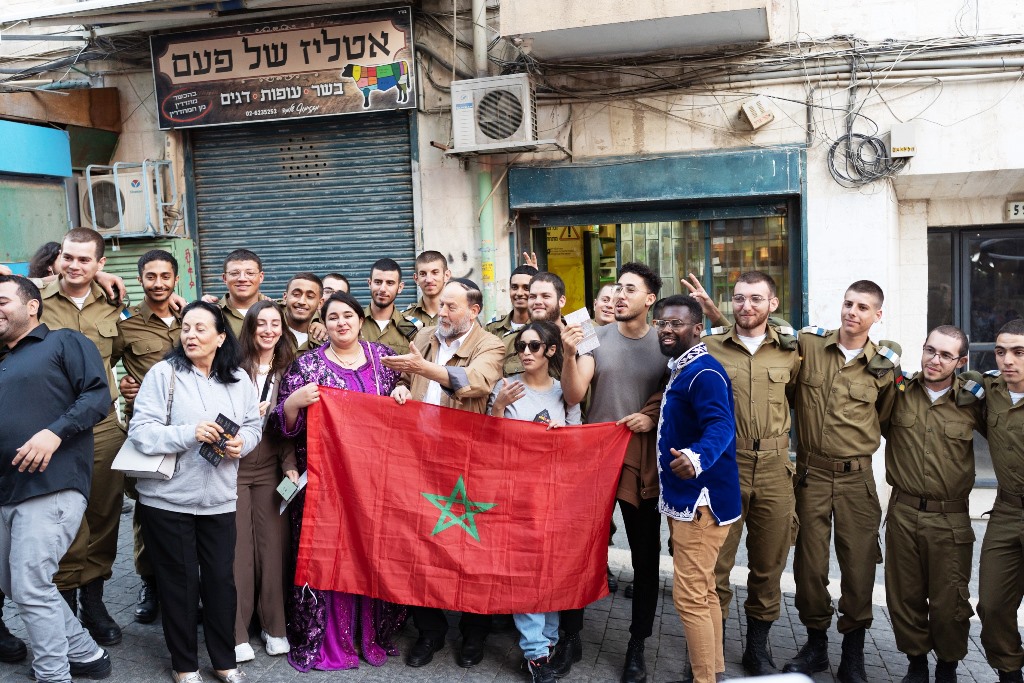Jerusalem, 12 May, 2022 (TPS) — By: Sheri Oz/TPS
A visit to Yad Vashem, Jerusalem’s Holocaust History Museum, is one of the most solemn parts of any visit to Israel. Standing among the hundreds of victims’ photos on display in the Hall of Names, a Moroccan Muslim asked if he could pray for them. Shocked and moved, the guide said that of course, he could. Suddenly the entire group broke out in Muslim prayer for the victims of the Holocaust.
Twenty Moroccan professionals between the ages of 25 and 35 were hosted in Israel for a week by 20 young Israeli professionals as part of the “Leaders for Tomorrow” program run by the NGO ISRAEL-is. They partnered with Mimouna, a Moroccan association that promotes the preservation of Moroccan-Jewish heritage in that country.
Before 1948, there were about 350,000 Jews in Morocco, or 10% of the country’s population. They had a rich cultural life and, as in other Arab countries, they were considered inferior to the Muslims and had to pay the Jizya special taxes. However, relations between the Jews and the Muslims were generally warm. This changed with the declaration of the State of Israel and the neighboring countries’ attack on Israel. With growing persecution against the Jews, almost all of them left the country within a decade, mostly to Israel. Only 2,000 Jews remain there.
Before arriving, the Moroccan participants experienced a degree of discomfort at the thought of being in Israel – both because of all the negative press Israel gets in mainstream and social media, and because the trip coincided with a particularly tense wave of terrorism in Israel. A theme heard repeatedly throughout the visit was their surprise at how easily they connected with Israelis and found more similarities than differences between Moroccans and Israelis.
Basma Okbi, 31, is one member of the Moroccan delegation. She described her experience at the Friday evening prayer service at the Great Synagogue of Jerusalem. She said going into a synagogue was familiar to her because she had visited many synagogues in Morocco, but she had never before witnessed prayer.
“I didn’t know I was going to have all the feelings that were coming,” she said. “I tried to do the same as what the Jewish worshipers were doing – when they stood, I stood, without understanding why.” The fact that there were particular actions that accompanied particular parts of the prayer was familiar to her from Muslim prayer.
“They gave me the Torah in English and pointed out the verses where the rabbi was reading and I started exploring some of the pages. When I started reading the part about reward and punishment, I felt something in my heart. It was similar to something we have in Islam. We are all going for the same thing and we all have the same destination. Why are we in a conflict when we all have a final destination? We are all going to be rewarded if we do good things and all punished if we do bad things. I feel emotional talking about it and I could start crying again.”
Israeli Mai Avni, 27, described the challenges of showing the Moroccan delegation around the Old City of Jerusalem. “It’s a very complicated place,” she said. “They hear about the terror attacks, the bad things that happen, and not the good – how people live together.”
“I really feel passionate about Israel. I love my country and I want to show them how I see it. I was in the army for six years, traveled a lot and I want to show them how I see my country,” she added.
Mai said that the Moroccan participants were surprised by Israel, by the diversity of places and people. Israelis they met would hug them when they said they were from Morocco. This was similar to her experience on their trip to Morocco six months ago, at the start of the program – everywhere in Morocco, people were happy to meet Israelis and told her that they would like to visit the country.
Basma shed light on the incredible contradiction in attitudes toward Israel within Morocco. On the one hand, they are not allowed to refer to Israel as a state and even mentioning the name of Israel can get one labeled a traitor. On the other hand, both sides of her own family were raised in the Jewish quarter of Casablanca.
“My grandparents worked with Jews,” Basma explained, “so they had great experiences and memories with Jewish Moroccans. My mother was breastfed by a Jewish woman.”
In December 2020, Morocco joined the other signatories to the Abraham Accords following the United Arab Emirates, Bahrain, and Sudan. There are now direct flights between Morocco and Israel, defense cooperation, and blossoming business links. However, tensions surround the agreement in Morocco, with King Mohammed VI promoting better relations with Israel while Prime Minister Saadeddine Othmani is against it.
Normalization has brought only a negligible amount of tourists from Morocco to Israel. Yet, because of the strong attachment of Moroccan Jews to the country, about 50,000 Israelis have visited Morocco annually over the past two decades.
As Morocco and Israel forge diplomatic relations, the NGOs ISRAEL-is and Mimouna are bringing together young professionals to promote sustainable personal connections between the countries.
Two long-term projects emerged from the “Leaders of Tomorrow” program. One involves collaborative projects between the deaf populations of both countries, and the other is a tourism venture that will connect visitors to locals in both Morocco and Israel, locals who will expose them to the sides of each country tourists rarely see.
It is initiatives such as this that will breathe life into the contracts signed by political leaders.
